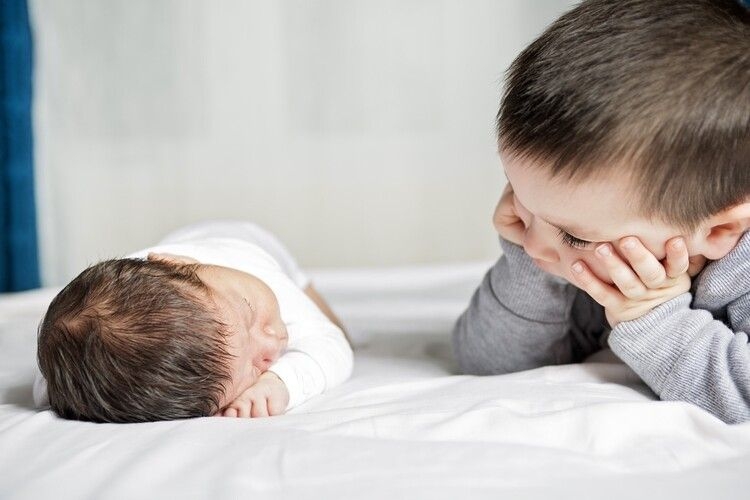Being the parent of a premature baby can be confronting, but plenty of support is available to you. If you are already the parent of another child, you will need to manage their expectations and understanding around their premature sibling as well as your own. You may experience a bit of a learning curve as you adjust to your new reality, but with the guidance of your hospital team, loved ones and other professionals, most families get through the experience together.
What do I tell my older children?
Your approach to talking about the new baby should be honest, while remaining age-appropriate for your other child or children. You can explain that their new sibling is a bit too small or sick to come home just yet, so they’re staying at the hospital so doctors and nurses can help make them better.
Your child’s routine will change. With you making visits to see the baby and being in a strained emotional state, things at home will likely change. Disruption to routine can be upsetting to children, so do your best to maintain what you can and talk through with them what you can’t.
Dividing your attention
Children often feel jealousy about sharing their parents with a new sibling. With a premature sibling away at the hospital, your older child may be frustrated that you’re away more and might have a hard time feeling close to the baby as a sibling.
With routines and the home environment changing, your child’s behaviour may change in an attempt to get more attention. This may look like misbehaving in new ways or struggling emotionally.
You may be able to support them through this time by ensuring they are getting enough attention, if not from you, then from someone they know. If you have family friends, grandparents, a favourite babysitter, or parents of your child’s friends, you can ask them to spend some extra time with your older kid. Remind your child you love them as much as you ever did and prioritise doing things together and being present when you can.
Your older child’s worries
Your older child may be confused by the premature arrival of their sibling. Common worries amongst young children can be:
- “I caused this to happen”. Whether it was a wish that they didn’t want to have a new sibling, or a fear that they hurt the baby by hugging mum too tight while she was pregnant, it’s important to tell your child this has nothing to do with them and it is not their fault.
- Thinking you are sad because of something they did. You may be sad or anxious through this time and your child will likely notice. Explain to them you are sad because you wish the baby could come home, not because of anything they did. If you are feeling anxious or depressed, speak with your healthcare professional.
- Fear they too will get sick. Young kids may only understand illness in terms of contagious colds etc. Explain that no one caused this and no one can catch it.
If your hospital’s Neonatal Intensive Care Unit or Special Care Nursery allows sibling visitations, letting your children meet can have a positive impact. We appreciate this might not be possible during time of lockdowns and restrictions. If your child is allowed to visit then prepare them for the visit by explaining what the baby looks like, and what the unit or nursery may look like. Give them a heads up about certain tubes or machines and let them know they aren’t hurting the baby but are there to help.
A resource to support you in preparing your older children for this experience is the Life’s Little Treasures ‘My Colourful Journey’ colouring book. It educates siblings about what they might see, hear and feel in a neonatal unit, helping parents to normalise emotions and supporting siblings through all the change.
Encourage your child to take their new sibling a gift, like a photo, toy or drawing. This can help them to feel connected. If you’re not sure how to answer some of your child’s questions, ask a nurse or doctor to pop over and help out.
Having a premature baby at the hospital and another child at home can be stressful. Struggling through this time is understandable – reach out for help to your GP, support groups at the Life’s Little Treasures Foundation, your psychologist and friends and family. Try your best to maintain some stability for your older child while still prioritising your mental health. You are in this together and with the right support, many families can come out the other side with all kids healthy at home.
Recommended Articles:
https://www.babybunting.com.au/baby-talk-blog/understanding-premature-births/
https://www.babybunting.com.au/baby-talk-blog/preparing-for-a-premature-birth/



